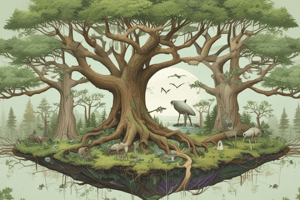Podcast
Questions and Answers
What is the primary factor that influences ecological balance?
What is the primary factor that influences ecological balance?
- Species diversity (correct)
- Water availability
- Food chain complexities
- Climate stability
Which of the following best describes a keystone species?
Which of the following best describes a keystone species?
- A species that has a disproportionately large effect on its environment (correct)
- A species that primarily exists in aquatic habitats
- A species that is only found in a specific geographic area
- A species that is abundant and dominates the ecosystem
How does human activity often disrupt natural ecosystems?
How does human activity often disrupt natural ecosystems?
- By increasing genetic diversity
- By introducing non-native species (correct)
- By fostering symbiotic relationships
- By enhancing nutrient cycling
What role do producers play in an ecosystem?
What role do producers play in an ecosystem?
Which process is most directly responsible for the cycling of nutrients in ecosystems?
Which process is most directly responsible for the cycling of nutrients in ecosystems?
Flashcards are hidden until you start studying
Study Notes
Ecological Balance
- Key factors that influence ecological balance:
- Biodiversity: A wide variety of species contributes to a robust ecosystem.
- Habitat availability: Adequate space and resources are crucial for sustaining populations.
- Predator-prey relationships: Maintaining balance between predator and prey populations.
- Nutrient cycling: The movement of essential elements within an ecosystem.
- Climate stability: A stable climate ensures consistent conditions for organisms.
Keystone Species
- Keystone species are species that have a disproportionately large impact on their ecosystems, often in relation to their abundance.
- Their removal can significantly alter the ecosystem structure and function.
- Examples: Sea otters in kelp forests, wolves in Yellowstone National Park, and large predatory fish in coral reefs.
Human Impact on Ecosystems
- Habitat destruction: Clearing land for agriculture, development, and logging.
- Pollution: Introducing harmful substances into the air, water, and soil.
- Invasive species: Introducing non-native species that can outcompete native organisms.
- Climate change: Modifying weather patterns, leading to shifts in species distribution and ecological interactions.
- Over-exploitation: Harvesting resources at unsustainable rates.
Producers in Ecosystems
- Producers are organisms like plants and algae that capture sunlight and convert it into chemical energy through photosynthesis.
- Producers form the base of the food chain, providing energy for all other organisms.
- They are essential for cycling nutrients within an ecosystem.
Nutrient Cycling
- Decomposition: Breakdown of dead organisms and waste products by microorganisms, releasing nutrients back into the ecosystem.
- Nutrient uptake: Producers absorb nutrients from the soil and water.
- Consumption: Consumers obtain nutrients by eating producers or other consumers.
- Excretion: Waste products from organisms return nutrients to the environment.
Studying That Suits You
Use AI to generate personalized quizzes and flashcards to suit your learning preferences.




